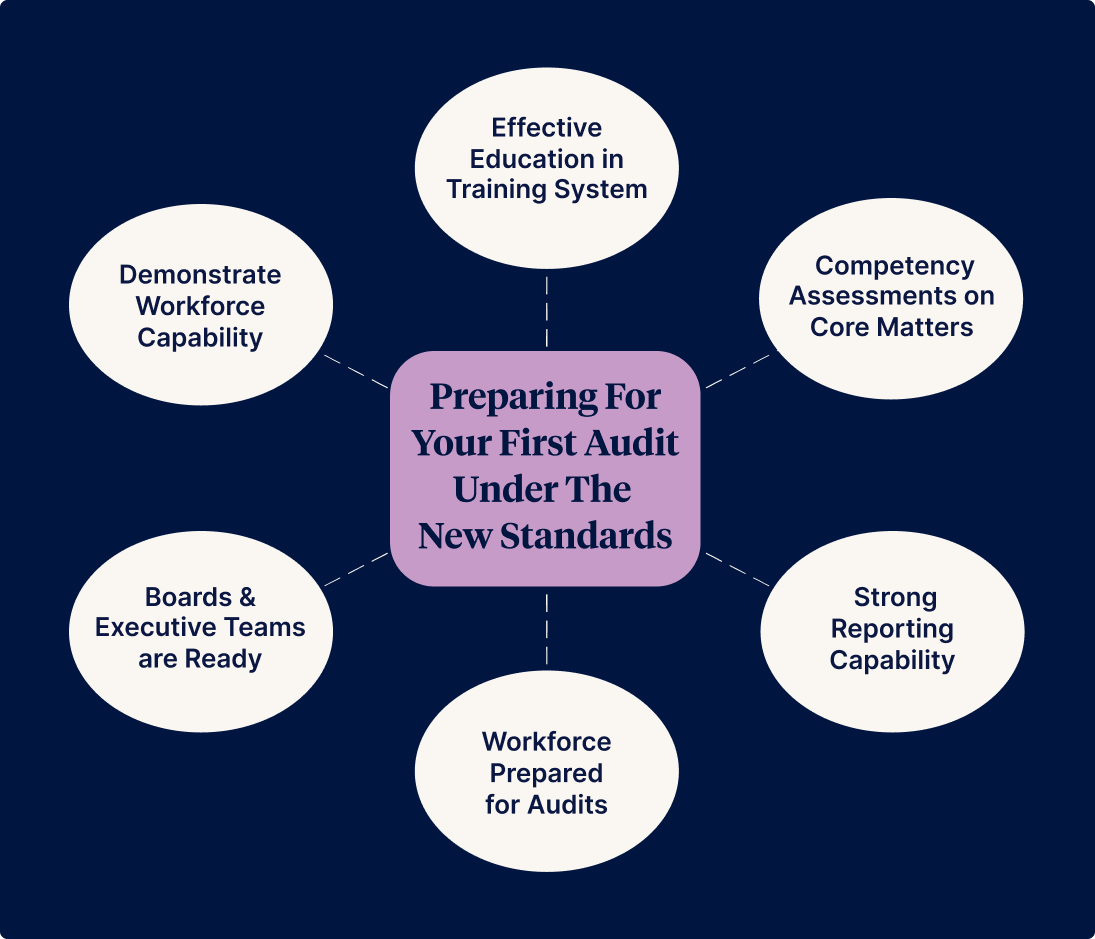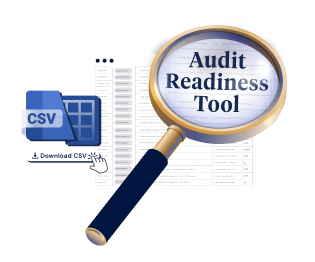Why Audit Readiness Matters
The strengthened Aged Care Quality Standards go live on July 1, 2025, and providers must be audit-ready from day one—there’s no grace period. While many organisations are working hard to prepare, without a structured, systematic approach, providers risk spending months preparing in ways that don’t actually lead to compliance.
One of the biggest challenges is understanding what auditors will be looking for. Over 1,200 possible evidence items may be requested, covering training system effectiveness, workforce capability, governance structures, and reporting processes. These requirements impact all levels of an organisation, from the workforce to boards and executive teams. All functions in an aged care organisation need to be aligned and coordinated.
So, what does it really mean to be audit-ready under the strengthened Standards?
Effective Education and Training System
The strengthened Standards place significant emphasis on education and training. It’s no longer enough to provide staff with training modules and track completions - audits will assess outcomes, not just compliance. Providers must demonstrate that training is effective, evidence-based, and leads to measurable improvements in care quality.
This requires an effective training system, not just a collection of learning records. Providers must ensure:
- Staff receive targeted, high-quality training relevant to their roles.
- The training system incorporates ongoing competency assessments to validate learning.
- Training content is evidence-based, up-to-date, and aligned with best practices.
- There is clear reporting to track participation, progress, and impact.
With greater training demands and compliance expectations, organisations need a structured, automated training system that minimises administrative burden, integrates with workforce planning, and enables real-time reporting - not just spreadsheets.
Demonstrating Workforce Capability in Audits
One of the biggest changes under the strengthened Standards is the increased focus on workforce capability. Workers are expected to be skilled, competent, and able to provide high-quality care.
Workforce capability isn’t just about education — it requires:
- Regular performance monitoring and competency assessments.
- Ensuring staff work within their scope of practice and have the right qualifications.
- Workforce planning that anticipates risks, such as staff shortages and training gaps.
For L&D and People teams, this means having robust processes in place to track staff skills, competencies, and training effectiveness. Without clear evidence of workforce capability, organisations risk compliance failures, increased regulatory scrutiny, and potential penalties.
Competency Assessments: More Than Just a Checkbox
Competency assessments are a critical requirement under the new Standards — not just an administrative checkbox. Auditors will ask providers to demonstrate staff competence in core matters. Self-reporting or completing training modules will not be enough.
Competency assessments should be:
- Practical, fair, and evidence-based.
- Integrated into ongoing professional development rather than treated as one-off evaluations.
- Linked to workforce planning to ensure staff skill gaps are proactively addressed.
Providers must shift their thinking from “Have we provided training?” to “Can we prove that staff are competent?”. Failing to meet these expectations could lead to poor audit outcomes and compromised care standards.
Boards and Executive Teams Must Also Be Audit-Ready
Many providers focus on quality, L&D, and operational teams when preparing for an audit, but board and executive teams also carry significant responsibilities. Governance structures must support effective leadership, decision-making, and compliance oversight.
Board members and executives should:
- Ensure clear accountability frameworks are in place.
- Oversee risk management, workforce planning, and training system effectiveness.
- Regularly review audit readiness, compliance metrics, and governance processes.
Strong governance isn’t just about policies. It’s about ensuring real oversight and accountability. If leadership teams aren’t actively involved in planning workforce capability initiatives, providers risk failing audits and missing crucial opportunities to grow and scale the workforce.
Reporting and Workforce Preparation Can’t Be Overlooked
Beyond training and governance, audit readiness also includes building reporting capability for an audit situation and ensuring the workforce is fully prepared.
- Providers must have clear, structured audit reports demonstrating compliance across multiple areas, from workforce capability to risk management.
- Staff need to know what to expect during an audit, be ready to answer questions, and understand how their role contributes to compliance.
- Auditors will observe care practices and speak with staff and older people. This means providers must proactively embed quality and compliance into everyday practice, starting now, with staff and older people, not just reactively preparing for audits.

Preparing for Your First Audit
Audit readiness isn’t just about checking boxes—it’s an opportunity to strengthen workforce capability, improve care quality, and build long-term sustainability in the workforce.
By taking a structured, strategic approach to preparing for audits, providers can:
- Assign clear accountability for compliance across the organisation.
- Build workforce capability beyond minimum standards.
- Implement systems and processes that improve quality care long-term.
Aged care providers must start preparing now to avoid last-minute panic. Audit readiness isn’t just about passing — it’s about future-proofing aged care organisations to provide the highest standard of care way beyond July 1, 2025.

Ensure your organisation is prepared for your first audit under the strengthened Standards.
Watch Our Webinar
Want to know exactly what auditors will be looking for? Watch Ausmed’s free webinar, Preparing for Your First Audit Under the New Standards, to access our Audit Readiness Tool and get expert guidance from industry leaders.
References and Useful Resources
- Strengthened Aged Care Quality Standards - Aged Care Quality and Safety Commission
- Strengthened Quality Standards Provider Guidance - Aged Care Quality and Safety Commission
- Evidence Mapping Framework - Aged Care Quality and Safety Commission
Author
Zoe Youl
Zoe Youl is a Critical Care Registered Nurse with over ten years of experience at Ausmed, currently as Head of Community. With expertise in critical care nursing, clinical governance, education and nursing professional development, she has built an in-depth understanding of the educational and regulatory needs of the Australian healthcare sector.
As the Accredited Provider Program Director (AP-PD) of the Ausmed Education Learning Centre, she maintains and applies accreditation frameworks in software and education. In 2024, Zoe lead the Ausmed Education Learning Centre to achieve Accreditation with Distinction for the fourth consecutive cycle with the American Nurses Credentialing Center’s (ANCC) Commission on Accreditation. The AELC is the only Australian provider of nursing continuing professional development to receive this prestigious recognition.
Zoe holds a Master's in Nursing Management and Leadership, and her professional interests focus on evaluating the translation of continuing professional development into practice to improve learner and healthcare consumer outcomes. From 2019-2022, Zoe provided an international perspective to the workgroup established to publish the fourth edition of Nursing Professional Development Scope & Standards of Practice. Zoe was invited to be a peer reviewer for the 6th edition of the Core Curriculum for Nursing Professional Development.



